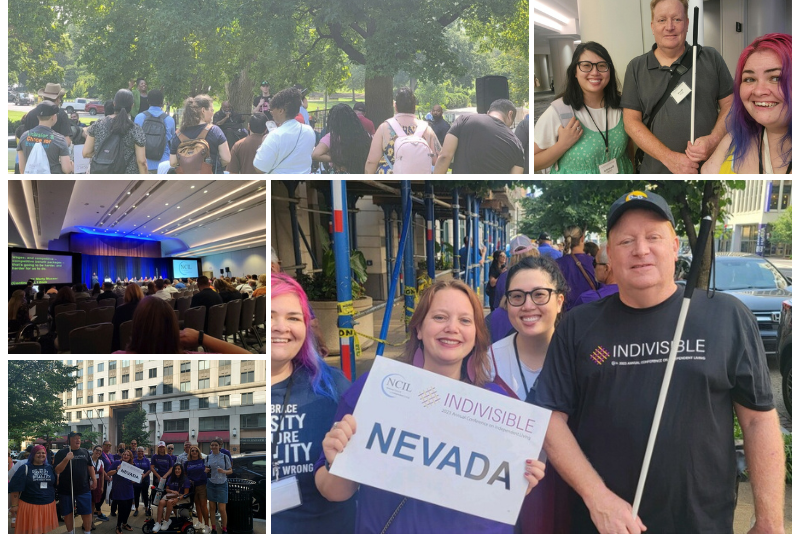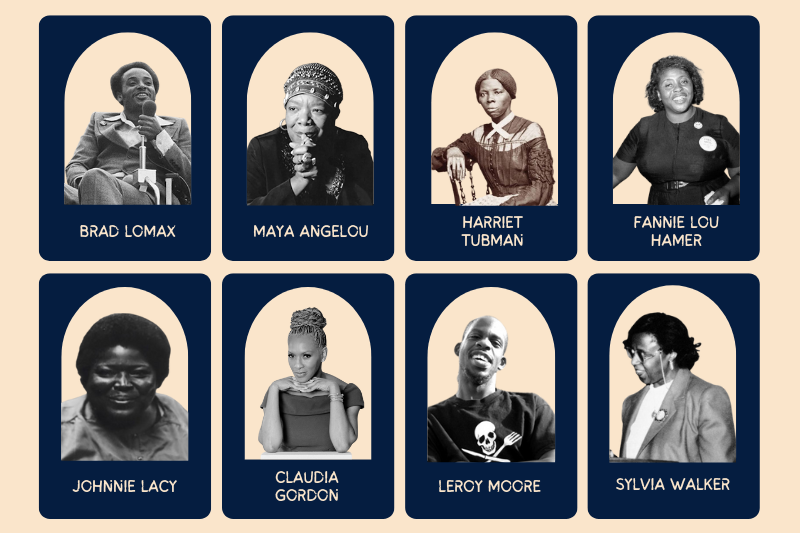In July, three Northern Nevada high school teachers joined Northern Nevada Center for Independent Living (NNCIL) Blind/Low Vision Advocate Mark Tadder for a field trip to Washington, D.C., to learn more about what they can do to help their students transition into adulthood.
The teachers’ trip was supported by NNCIL, in conjunction with the Nevada Statewide Independent Living Council, allowing them to attend the 2023 National Council on Independent Living (NCIL) conference, July 24 through 27.
Gabrielle Paredes, a Strategies educator at McQueen High School in Reno, was deeply impressed that the conference speakers were all individuals with disabilities, aligning with NCIL’s empowering mantra, “Nothing About Us, Without Us.”
“It just makes sense that people with disabilities should be the ones speaking for themselves, but that’s not always the case,” she said. “We need to hear from the people who are actually affected by various policies and lessons.”
She also appreciated the emphasis on language and word choice. “(NCIL Executive Director) Theo Braddy talked about ableism and how people refer to him as being ‘bound to a wheelchair,’” she said. “He reminded us that he’s not bound to it; it’s a tool he uses to get around.”
The entire conference reinforced these important messages while also sharing specific information in areas ranging from transitioning and advocacy to the importance of emergency preparedness.
“I learned a lot about what the transition from high school to independent living looks like for people who have a lot of support and people who may have less support,” shared Audrey Clark, who co-teaches freshman English as well as 11th and 12th grade SSTS/Life Skills at Hug High School. “I’ll be taking my experience at the conference and applying it to teaching my students what they need to be successful in transitioning to adulthood.”
Deanna Johnson, who teaches Strategies for students with autism at Hug High School, gained invaluable perspectives on the daily challenges faced by people with disabilities.
“Society still has a long way to go for accessibility. The simple act of dining out with Mark revealed how much we often take accessibility for granted,” she said, pledging to bring this newfound awareness into her classroom.
Gabrielle also liked learning more about NCIL and the resources they provide. She appreciated that she got to learn from so many people with disabilities, including NCIL Executive Director Theo Braddy.
“I’m looking forward to meeting with my students and their parents to make the transition easier as they graduate from high school,” she says.
Emergency Preparedness
The importance of emergency preparedness was a key topic at this year’s NCIL conference, and the Northern Nevada attendees definitely got something out of it.
“One thing I definitely got from the conference was the increased need for education on preparing for disasters and being prepared when they occur,” Mark said. “With recent events both here in Nevada and in other communities, it’s evident that it’s a timely discussion that we will use in our ongoing offerings to the consumer community.”
Gabrielle appreciated learning how this can be especially critical for people with disabilities, and she plans to take her newfound knowledge to her administrators to encourage them to make some changes on campus to make it easier for all students to handle an emergency.
Advocating for Change
The Northern Nevada group took advantage of their time in our nation’s capitol to meet with Nevada’s representatives, U.S. Senator Catherine Cortez Masto and Congressman Mark Amodei.
Gabrielle said this was her favorite part of the trip. “It was eye-opening to know that I really can use my voice to advocate for people with disabilities,” she said.
Mark agreed, saying, “I also very much like meeting with the congressional staffers and members of Congress, as they are always wonderful and receptive to our issues.”
United March on the Capitol
The conference culminated in a compelling March on the Capitol, rallying more than 1,000 participants. Both Paredes and Tadder spoke highly of the charged atmosphere and the impactful speeches, reaffirming their dedication to the cause.
Mark said he really enjoyed how the speeches showed the passion of the attendees. “The speeches that were made on the capitol grounds were very poignant and relevant to the issues of the day,” he says.
Building Collaborative Bridges
Beyond the formal agenda, the conference served as a catalyst for forging meaningful connections among the Northern Nevada educators and NNCIL, that will allow them to work together on behalf of their students and others with disabilities.
“I had a wonderful time at the conference, getting to meet and hear the experiences of so many people,” Audrey said.
Gabrielle appreciated the classes she was able to attend and the collaborations she was able to form at the conference. “We were able to talk about how our students are impacted as they transition into adulthood and the services that are out there that can make a profound difference for them,” she said.
Deanna said she also appreciated developing deeper connections with her fellow Northern Nevada teachers so they could work together more to help their students succeed.
While the teachers enjoyed learning from people with disabilities, Mark said he very much enjoyed spending time with these dedicated educators. “It was rejuvenating to be in the presence of people who are so interested in improving the community and helping people with disabilities progress from high school to being successfully independent as adults,” he said. “I liked knowing that they were going to go back to their profession with an increased awareness of the responsibilities their jobs can have over their students and their future lives.”
Audrey Clark summed up the group’s sentiment: “I’m so incredibly grateful for the experience that NNCIL provided us and cannot wait to continue working with them and NCIL to fight for disability rights and advocacy.”
This enriching experience has left the educators eager to implement what they learned, as they continue to advocate for a more inclusive and accessible future for their students and the wider community.



